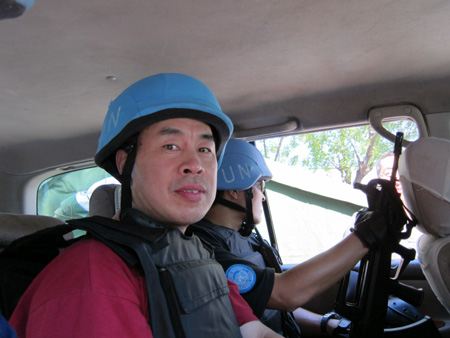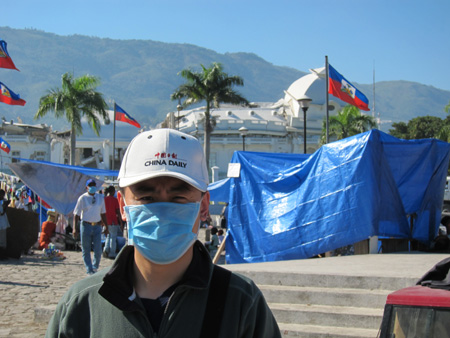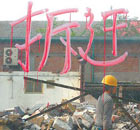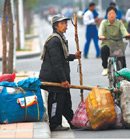Latest
Smelling is believing in Haitian capital
By Chen Weihua and Huo Yongzhe (chinadaily.com.cn)
Updated: 2010-01-22 11:40
 |
Large Medium Small |
PORT-AU-PRINCE: Seeing is believing is no longer true these days in the quake devastated downtown Haitian capital as dead bodies still buried under the rubble send out disgusting smells.
As days go by the smell is getting worse every day, said Bien-Alme Jamie, a college student whose school collapsed during last week's earthquake.
Many people, including aid workers, foreign journalists and some locals, are seen wearing mouth masks, while many locals, clearly having no access to masks, have to bear the smell after suffering the trauma more than a week ago.
The bad smell is something you cannot feel watching CNN, where the day's scary highlights are put together, said a French journalist who has covered the event for a whole week.
Another journalist complained that the smell of corpse is so bad that her hair and reporter's notebook also reeks of dead bodies.
|
 China Daily reporter Chen Weihua [chinadaily.com.cn] |
It is clear that excavating all the remaining dead bodies still remains a mission impossible for both rescue teams and locals.
Duval Wildport, an official with a central government ministry whose office building across the street from the Presidential Palace collapsed, looked at fallen building in bewilderment. "We need help, such as big machineries," he told China Daily.
Wildport, who fled the building immediately after sensing the trembling earth, said that eight people killed during the earthquake are still under the fallen building. Unlike the preventative measures taken after China's Sichuan earthquake, no one is seen spreading disinfectant in the ruins. This poses a serious threat to a possible epidemic in this poorest nation in the western Hemisphere.
Inside the Chinese UN Peacekeeping compound, where the Chinese rescue team is also stationed, people and trucks entering the area are being disinfected in order to avoid the possible spread of disease.
|
 China Daily reporter Huo Yongzhe [chinadaily.com.cn] |
The World Health Organization in a report a few days ago said that corpses do not represent a public health threat if the death is not initially caused by disease. The Pan American Health Organization also dismisses the risk of an epidemic, but warned that the only slight disease risk is from diarrhoea if faeces leaking from corpses contaminate drinking water.
As locals get less patient as relief material is still not distributed in plenty and hundreds of thousands of people still live in places that cannot be called tents, more troops are guarding government buildings that have collapsed and key areas to avoid crimes and unrest. In fact, the capital Port-au-Prince was hit by two other earthquakes about lunch hour Thursday.
While the Presidential Palace was still guarded by United Nations Peacekeeping Force from India, many local youth stood outside the fence to watch the US army helicopters take off and land on the lawn in front of the palace. Soldiers from US Airborne division in armored vehicles were guarding some of the collapsed government ministry buildings near the palace.
All signs show that bringing a normal life to the local residents is still a long way to go given a much less effective Haitian government at the moment and clearly logistic problems in distributing enough food and water to the people who have lost their homes and loved ones.













